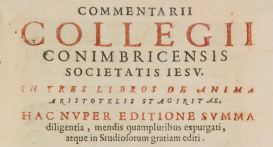The Coimbra Commentaries, published between 1592 and 1606, were intended to serve as the teaching manuals for the philosophy course structured around the Aristotelian Corpus in Jesuit colleges. Much as their intrinsic features reveal the commentators’ attempt at a systematic and innovative interpretation of a long-standing Aristotelian tradition of Aristotelianism, the commentaries also influenced key figures in the history of European philosophy and shaped the intellectual landscape of the early seventeenth century in a profound way. As the commentaries spread globally through Jesuit missionaries, they were reinterpreted in the effort to overcome cultural barriers, and became the locus of an exchange of ideas that took place between seemingly incommensurable ideologies. This project reconstructs the Coimbra Commentaries’ doctrine of sense perception and its reception in key seventeenth-century European and Chinese thinkers, taking into account the institutional, scientific, and cultural backgrounds underlying their genesis and reception. In particular, I examine what bearing developments in anatomy, alchemy, hermeticism, and other disciplines had on the Coimbran theory of sense perception, and how some of the most important seventeenth-century European philosophers responded to the Coimbran solution.
With its global focus, the project also attempts a first comparative study of the different reception histories of the Coimbra commentaries in Europe and China. It will bring the "big figures" of European philosophy, such as Descartes, Malebranche, Gassendi, and Cudworth—all of whom studied the commentaries as part of their education—into close conversation with the Chinese literati and scholars exposed to Jesuit teachings.

